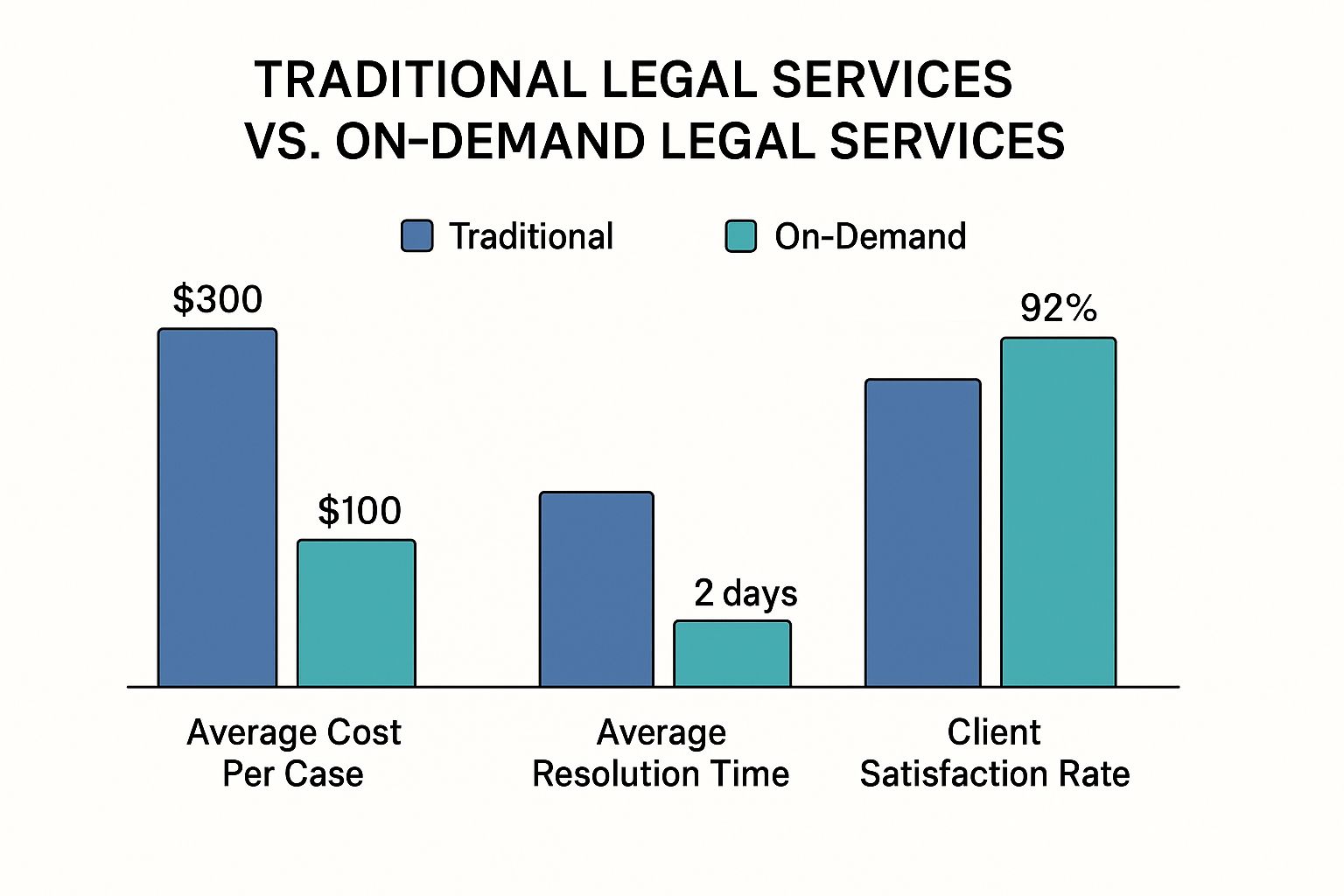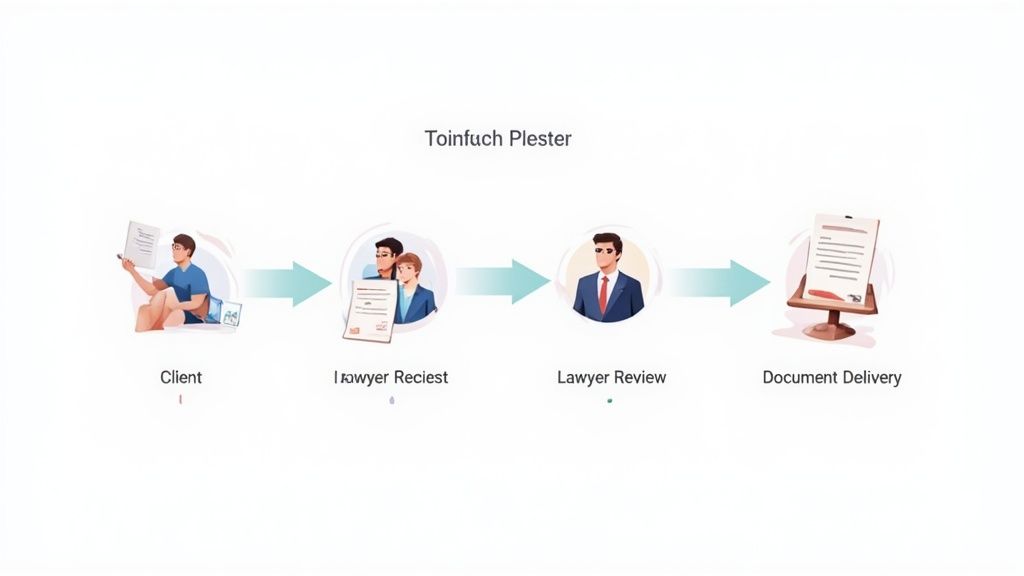
 18 minutes read
18 minutes read
Let's be blunt. Traditional legal support feels like it was designed to make founders question their life choices. You either pay a soul-crushing retainer for a lawyer you barely talk to, or you get nickel-and-dimed for every six-minute phone call. I've been there. I've stared at a $4,800 bill for a "simple" contract review and thought, "There has to be a better way."
And there is. It's called on-demand legal services. Think of it as the AWS for legal firepower. You spin up exactly what you need, when you need it, and you only pay for what you actually use. It’s not about finding cheap legal help; it's about finding smart legal help, without having to mortgage the office ping-pong table.

The old retainer model is a cash flow problem waiting to happen. You're essentially pre-paying for problems you haven't had yet. On-demand services flip that script with a beautifully simple pay-as-you-go model.
It's like renting server space from the cloud instead of building your own data center that sits idle 90% of the time. Why would you do that?
The AWS analogy isn't just a clever line; it's how this actually works:
My "aha" moment came after that gut-punch of a $4,800 invoice. I wasn't trying to cut corners on legal. I was just tired of a model where the incentives felt completely misaligned. The power dynamic needed to shift back to the client.

"I was staring at a bill for what amounted to just a few hours of work. I knew there had to be a smarter way to handle this without getting taken for a ride."
That moment kicked off my obsession with finding a better model, which led me straight to on-demand legal services.
Here’s the fundamental flaw with the old guard: they’re built around selling hours, not outcomes. This means you might be paying thousands a month just to keep them on standby, getting billed for every email and document review, whether it moves the needle for your business or not.
On-demand services align incentives. You pay when value is delivered, period. The result? Faster turnarounds, clearer budgets, and no more invoice-induced anxiety.
Imagine spinning up legal support with the same ease a developer spins up a server on AWS—elastic, responsive, and ready to go. That’s the promise, and for the most part, it delivers.
If you're ready to get off the billable-hour hamster wheel, this is your exit ramp.
One of our portfolio companies made the switch and cut their legal spend by 60% in the first quarter. Sixty percent.
Even better, their turnaround for contract reviews dropped from two weeks to just two days. That speed allowed them to close two extra deals they would have otherwise missed. That's not just saving money; that's making money.
If you're considering this, here's how to start without screwing it up:
This isn't about trading one rigid cost model for another. It's about building a flexible legal engine that grows and shrinks with you.
To see this in action, check out a platform like HireParalegals. They match you with a curated paralegal, often in under 24 hours, so you can start seeing the benefits immediately.
It’s time to move from guesswork and hidden fees to predictable, effective legal support.

Ready for legal help that actually fits your business? This is your chance to embrace on-demand and leave the billable hour in the dust where it belongs.
Let's be honest about that legal retainer on your books. It’s like a gym membership you're forced to buy, only to get charged extra every time you use the equipment. It gives you a false sense of security while quietly bleeding your budget and punishing you for seeking the very advice you’re already paying for.
For most growing businesses, the traditional retainer model is fundamentally broken. It’s a structure built to protect a law firm’s cash flow, not to optimize yours. You're trapped: either pay a hefty monthly fee for access you barely use, or get hit with surprise "overage" bills that make you hesitate to even pick up the phone.
The wasted money is obvious. You’re locked into a fixed payment whether you need a complex negotiation or nothing at all. But the hidden costs are where the real damage happens. It’s the opportunity cost—that money tied up in a retainer could be funding your next marketing campaign, hiring a key salesperson, or simply extending your runway.
Worse, the retainer model creates a psychological barrier. When you know every six-minute phone call is being logged, you start wondering if your "quick question" is really worth the inevitable invoice. This hesitation is poison. It leads to unvetted contracts being signed, compliance blind spots being ignored, and small risks quietly snowballing into giant legal headaches.

The real danger of a retainer isn't just the money you waste; it's the critical legal guidance you avoid seeking because you're afraid of the bill. It actively discourages proactive legal hygiene.
This isn't just my opinion; the entire industry is voting with its feet. The global online legal services market was valued at around USD 11.53 billion and is projected to explode to USD 36 billion by 2034. This isn't a fad. It's a market correction driven by businesses like yours demanding something better.
Let's put some numbers on this. Here’s a simple comparison for a small business with typical, sporadic legal needs over one year.
| Metric | Traditional Law Firm (Retainer) | On-Demand Legal Service (Pay-As-You-Go) |
|---|---|---|
| Upfront Cost | $3,000/month retainer | $0 (Pay per project) |
| Annual Base Cost | $36,000 | $0 |
| Actual Work Performed | 3-4 hours of work per month | 3-4 hours of work per month |
| Estimated Annual Spend | $36,000 (plus potential overages) | $8,000 – $12,000 (based on actual usage) |
| Cost Predictability | Low (overage charges are common) | High (upfront, fixed-fee pricing) |
| Budget Impact | Ties up significant monthly cash flow | Frees up cash for growth |
| Potential Savings | N/A | $24,000+ per year |
For a startup, a $24,000+ difference isn't just nice—it's a game-changer. That's a junior developer's salary, a huge chunk of your marketing budget, or the capital to avoid a dilutive funding round. When agility is everything, locking up cash in a static retainer is like driving with the parking brake on.
This chart drives the point home. It's not even a fair fight.

The data is clear. On-demand isn't just cheaper; it's a faster, smarter, and more client-centric way to handle your legal needs.
The advantages of on-demand legal services go way beyond cost savings. As a growing business, your biggest weapon is agility. You can pivot on a dime and execute faster than your bureaucratic competitors can schedule a meeting.
An on-demand model is built for that speed. Here’s how:
Switching isn't just about cutting an expense. It's about changing how you use legal expertise to grow smarter. As you scale, knowing exactly what things cost is critical. For instance, check out this breakdown of virtual paralegal rates to see how granular and predictable this can get.

Alright, let's get into the weeds. Not all on-demand legal services are created equal. The space is crowded with everything from brilliant platforms to glorified template farms that will sell you a one-way ticket to compliance purgatory.
Diving in blind is like walking into a hardware store and grabbing the first tool you see. Sure, a sledgehammer can hang a picture frame, but I wouldn't recommend it. Let's dissect the main models so you don't end up with a giant hole in your wall.
First up: the fully automated, do-it-yourself platforms. They promise to incorporate your business or draft an NDA for the price of a fancy lunch. For dead-simple, standardized tasks? They can be a godsend.
The problem is, business is rarely simple. The moment you need a clause tweaked for your industry or have a question about state-specific compliance, the robot just stares back blankly. Hope you enjoy spending your afternoon on Google trying to figure out if that template is even enforceable in California.
For any business more complex than a lemonade stand, relying solely on a DIY bot is a risky bet. It’s cheap for a reason.
Next are the marketplace models—the Upwork or Fiverr for lawyers. You post a job, and freelancers bid for your project. On the surface, this sounds great. Competition drives down prices, right?
Sometimes. But it also means you’re now the hiring manager. You have to sift through profiles, vet credentials, and pray the person you hire actually has the expertise they claim. Hope you enjoy spending your afternoons fact-checking resumes and running interviews—because that’s now your full-time job.
It's a viable option if you have the time and experience to vet legal talent. If not, it becomes a part-time job you never wanted.

The real currency here isn't just money; it's your time and your tolerance for risk. A marketplace might save you a few hundred dollars, but it could cost you dozens of hours in vetting and management.
Finally, there’s the hybrid model, which, in my opinion, is where the magic happens. These platforms pair smart technology with a curated network of actual, vetted human lawyers and paralegals. They do the soul-crushing work of finding and verifying top-tier talent, so you don’t have to.
This model gives you the best of both worlds: the efficiency of a tech platform and the nuanced expertise of a real legal professional who gets your business. You get the speed and cost-effectiveness of on-demand without sacrificing quality.
This is the approach we’ve found to be the most scalable and reliable. It removes the guesswork and lets you focus on your business. It's what makes high-quality legal outsourcing services not just possible, but incredibly effective.
The bottom line is simple. For no-brainer tasks, a DIY platform might work. If you have the bandwidth for a hiring project, a marketplace is an option. But for consistent, high-quality legal support that scales with you, the hybrid model is the clear winner. (Toot, toot!) It’s about that perfect balance between automation and irreplaceable human judgment. Choose wisely.
So, you’re sold on the idea. Great. Now comes the hard part: picking the right partner without getting burned. This isn’t about finding the cheapest option; it’s about finding the smartest one. A slick landing page can hide a multitude of sins.
I wish I’d had a guide like this when I started. It would have saved me time, headaches, and at least one awkward conversation with an underqualified "expert." Let's walk through the critical questions you need to ask before signing anything.
First things first: pull back the curtain. Who are the actual humans handling your legal tasks? Some platforms are just thin veils over a random freelancer marketplace. Others have a rigorously vetted network. Don't be shy. Ask.
Here’s your checklist:
You need to know if you're getting a seasoned pro or someone learning on your dime. The goal is to offload work, not create a new management headache for yourself.
“Starting at $49” sounds great until you discover that only covers them spelling your company’s name right. Vague pricing is the oldest trick in the book. Dig for the all-in cost before you commit.
Get answers to these in writing:
A trustworthy partner will offer clear, upfront, fixed-fee pricing. If their pricing model feels like a riddle, walk away.

This isn't just about vetting a vendor; it's about finding a partner who respects your budget and intelligence. Ambiguity in pricing is a direct reflection of how they'll treat you as a client.
What happens when you have an urgent question at 5:01 PM on a Friday? Or when you need to share highly sensitive documents? A lack of human support and weak data security are deal-breakers. Your legal partner is an extension of your team; they need to act like it.
Demand clarity on their protocols. How do they handle data security and client confidentiality? Is support a real person who understands legal workflows, or are you stuck with a chatbot? For a sense of what to expect, check out how established providers structure their virtual paralegal services.
This is especially critical in the massive legal services market, which was valued at USD 1,052.90 billion. With North America owning over 41% of that pie, the standards for security are incredibly high. A platform that skimps here isn't just unprofessional; it's a liability. You can get more details from the full research on the global legal services market. Choosing a partner who takes this seriously is non-negotiable.

Step back for a second. The rise of on-demand legal services isn’t just about saving a few bucks on a contract review. This is the start of a much larger shift.
If traditional on-demand was a faster horse, what’s coming next is the self-driving car. Suddenly, agile startups have access to the same legal firepower that was once reserved for Fortune 500 companies.
We used to joke about legal tools that sounded like science fiction. Now, they're becoming standard practice.
Here are a few that have already left the lab:
These aren't just incremental improvements. They’re changing the game from reactive problem-solving to proactive, data-driven strategy.
For years, top-tier legal advice came with an eye-watering price tag. If you couldn't afford the retainer, you were on your own.

The real win here isn’t about the gadgets; it’s about access. A founder in Columbus can now tap into the same contract insights that a legal team in a Manhattan skyscraper uses.
That shift levels the playing field. While bigger companies are still haggling over hourly rates, you can get your legal tasks done and keep moving.
The numbers don't lie. The online legal services market, currently valued at USD 25.24 billion, is projected to hit USD 42.02 billion by 2029, growing at 13.6% annually. This isn’t a niche trend; it's a full-blown transformation. You can discover more insights about this market shift.
Staying ahead of this curve isn’t optional anymore. It’s how you outsmart bigger rivals. The future of legal support isn’t coming soon—it’s already here. Are you plugged in?
Alright, let's cut to the chase. You've heard the pitch, but you've still got questions. That's smart. As someone who’s been in the trenches and tried just about every model, I get the skepticism. Here are the no-fluff answers.
Honestly? It depends. For your bread-and-butter legal work—contract reviews, company formation, basic IP filings—a quality on-demand service is often faster and more efficient than a traditional firm. The trick is to look past the slick website and find out who’s actually doing the work.
Are they using real, vetted lawyers, or are you just getting a glorified template? For complex, bet-the-company litigation, a traditional firm is probably still your go-to. The point isn’t to replace every law firm on the planet. It’s to stop using a sledgehammer to hang a picture frame. Use the right tool for the job.
The sweet spot for on-demand legal services is anything transactional or compliance-related. It’s the stuff your business needs regularly, but not constantly.
Think tasks like:
If you have recurring legal needs but can't justify a full-time counsel, this is your playground.

A critical question to ask any provider is this: "How do you protect my confidential information?" If they can't give you a straight answer on end-to-end encryption, secure storage, and attorney-client privilege, run. Don’t walk.
Legitimate platforms are bound by the same confidentiality rules as any law firm. A vague privacy policy is a massive red flag. It tells you they don't take your business, or their own, seriously.
Absolutely, and you should. The best on-demand platforms aren’t faceless portals. The marketplace and hybrid models are designed to help you find and stick with pros who actually get your business.
Once you find a lawyer or paralegal you click with, you can often work with them exclusively on all future projects. This gives you the best of both worlds: the consistency of in-house counsel with the flexibility and cost-efficiency of the on-demand model. You’re not just buying a one-off task; you’re building your bench.
Ready to stop guessing and start building your flexible legal team? HireParalegals connects you with a curated network of over 10,000 vetted legal professionals, so you can find the right expertise in as little as 24 hours. Find your perfect match today.